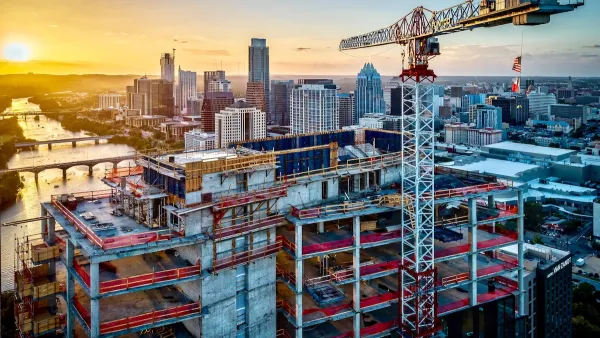The new American household is much like the old multigenerational household that existed before World War II, recent population trends show. And builders are responding by offering "bonus" and "flex" rooms, while circumventing outdated zoning.
Penelope Green examines efforts by the nation's largest homebuilders to "accommodate the changing shape of the American family: boomer couples with boomerang children and aging parents, an increasingly multiethnic population with a tradition of housing three generations under one roof, and even singles who may need to double up with siblings or friends in this fraught economic climate."
Lennar, Pulte, Ryland and KB Homes all offer alternatives that can provide semi-private accommodations for additional household members without running afoul of zoning that bans accessory dwelling units.
"Scott Thomas, national director of product development for PulteGroup, the largest homebuilder in the United States, said his company now offers layouts with larger 'flex rooms' and an over-the-garage apartment it calls the Grand Retreat," notes Green. "Ryland and KB Homes have been offering similar alternatives, and have seen their popularity increase as multigenerational households become more common."
"'For whatever reason,' Mr. Thomas said, 'whether it’s the return of something that was part of our lifestyle in the past, or simply related to the economy, multigenerational living is definitely taking place.' Thirty percent of Pulte customers are asking for such features, the company said."
And what about the pesky “dead hand of single-family zoning,” noted by Michael Litchfield, the author of “In-Laws, Outlaws, and Granny Flats: Your Guide to Turning One House into Two Homes”? "To circumvent zoning that is leery of duplexes," says Green, "Lennar’s Next Gen houses run on a single electric meter, have only microwave convection ovens in the apartment, and from the outside look like other houses."
“One address, one hookup, one electric meter,” said Alan Jones, Lennar’s Arizona division president.
FULL STORY: Under One Roof, Building for Extended Families

Maui's Vacation Rental Debate Turns Ugly
Verbal attacks, misinformation campaigns and fistfights plague a high-stakes debate to convert thousands of vacation rentals into long-term housing.

Planetizen Federal Action Tracker
A weekly monitor of how Trump’s orders and actions are impacting planners and planning in America.

Chicago’s Ghost Rails
Just beneath the surface of the modern city lie the remnants of its expansive early 20th-century streetcar system.

Bend, Oregon Zoning Reforms Prioritize Small-Scale Housing
The city altered its zoning code to allow multi-family housing and eliminated parking mandates citywide.

Amtrak Cutting Jobs, Funding to High-Speed Rail
The agency plans to cut 10 percent of its workforce and has confirmed it will not fund new high-speed rail projects.

LA Denies Basic Services to Unhoused Residents
The city has repeatedly failed to respond to requests for trash pickup at encampment sites, and eliminated a program that provided mobile showers and toilets.
Urban Design for Planners 1: Software Tools
This six-course series explores essential urban design concepts using open source software and equips planners with the tools they need to participate fully in the urban design process.
Planning for Universal Design
Learn the tools for implementing Universal Design in planning regulations.
planning NEXT
Appalachian Highlands Housing Partners
Mpact (founded as Rail~Volution)
City of Camden Redevelopment Agency
City of Astoria
City of Portland
City of Laramie




























